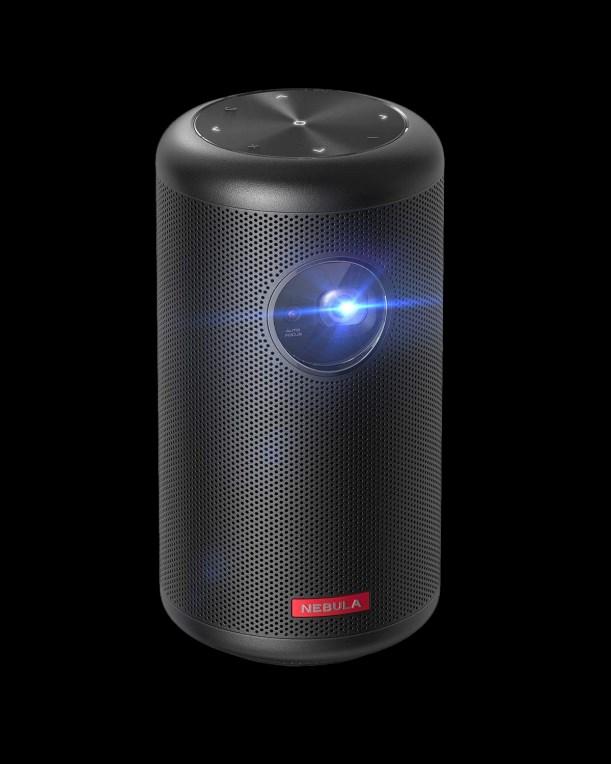
4 minute read
Shiny New Gadget Of The Month: How Recessions Benefit Great Companies
Capsule II Smart Portable Projector

Advertisement
There’s nothing quite like watching your favorite movie under the stars. Now, doing so has become easier with the Anker NEBULA Capsule II Smart Portable Projector. This projector is great for indoor and outdoor use since it has a great picture and built-in speakers. It runs on Android TV 9.0, which allows you to access a wide range of streaming services – Hulu, YouTube and more – without needing an external device. This projector is as portable as it gets since the NEBULA Capsule II is only the size of a soda can. It is the perfect device for any situation, whether you’re going camping, hosting an outdoor party or simply want a large screen for video games or movies.
Recessions are bad for most people, and I won’t make light of how horrible these times can be for the vast majority of companies and their employees. It’s true that for most companies, recessions mean increased stress at work, stalled career progression or even layoffs, uncertainty, raised board and shareholder pressure, increased financial strain and extreme anxiety. It’s no fun to wake up to that every day! But for great companies, people can turn things around and make recessions awesome.
So, what are great companies? They’re the ones that make great products or deliver exceptional services to customers. They provide a wonderful work culture that attracts and retains talented people. And because they take good care of their customers and employees, great companies don’t have a dangerous debt burden. They are profitable, can pay their bills to suppliers and deliver an attractive return to investors in dividends and equity appreciation.
Recessions are awesome for certain companies for the following reasons.
Losing The Cobwebs Of Complacency
“Success breeds complacency.” Andy Grove, the legendary CEO of Intel, wrote that. And while I’m not here to suggest everybody embrace full-on “paranoia” in the workplace, I am suggesting that successful companies must keep hustling to stay on top. A recession provides an opportunity for a wake-up call to companies that may otherwise start coasting. Now is the time for them to get back on track.
Taking Customers And Colleagues From Undeserving Companies
I’m not sure why customers buy products or services from lesser companies. And I’m not sure why talented people work at lesser companies. Maybe it’s due to convenience, connections or just habit. In any case, as lesser companies stumble during a recession (e.g., shutting locations, letting service and quality drop, highlighting dysfunction in the culture, etc.), it’s the perfect time for great companies to pick up more of these customers and talented people.
Increasing The Rate Of Learning For Your Leaders
I don’t know about you, but time seems to move more quickly for me during harder times than when things seem easy. This can enhance the learning curve of your up-andcoming leaders. Just remember not to make too many decisions for them that will stunt their growth. Allow your leaders to come to you with problems and solutions so you can aptly coach and support them. Let them test and learn various approaches to leading through uncertain times.
If you buy from a lesser company or work at one, the next recession is likely to be a bummer for a couple of years. But if you work at a great company, fear not. This will be an awesome opportunity to shake loose some cobwebs of complacency, take customers and colleagues away from lesser companies and increase the rate of learning of your leaders.
Dr. Geoff Smart is the chairman and founder of ghSMART, a leadership consulting firm that exists to help leaders amplify their positive impact on the world. Dr. Smart and his firm have published multiple New York Times bestsellers. He stays active in his community and has advised many government officials.
Let Your Employees Know You Care With These 3 Tactics
If an employee is unhappy working for your company or doesn’t feel appreciated by their leadership team, they will search for a new job. This has left many leaders questioning what they can do to show their employees they actually care about them and their well-being. Here are a few different ways to show your team you care.
Growth Opportunities
Most employees want to work somewhere with the potential for advancement. It’s important to connect with your employees through one-on-one meetings so you can determine how they want to grow professionally and personally.
Foster A Supportive Work Environment
Nobody wants to work at a business where they don’t feel accepted, supported or appreciated. Go out of your way to create an inclusive environment and give your team a sense of belonging.
Recognition
Your employees want to hear about it when they do well. Don’t be afraid to recognize or reward them when they’re doing a great job. Simply thanking your employees for their hard work can go a long way toward improving overall morale.
Are You Micromanaging Your Team?
There are many different management styles, but one that always seems to upset employees and take away from productivity is the act of micromanaging or overcoaching. Micromanaging occurs when a leader provides instructions that are too specific while watching over the team as they perform their tasks, looking for any lapse in perfection they can then bring up to the employee. It’s a frustrating practice that can send well-qualified employees running out your doors.
So, how do you know if you’re micromanaging your team? Pay attention to how you’re directing them. You won’t get a preferred response if you tell your billing manager how to do their job. You hired these employees to perform specific roles, and they have the experience to do it well. So, let them work until there’s a need to redirect or re-analyze the situation. Ask for feedback when you conduct one-on-one meetings with your team. Listen and make the necessary adjustments if they say you’re micromanaging. This will help boost productivity in your business while you still get the most from your team.







